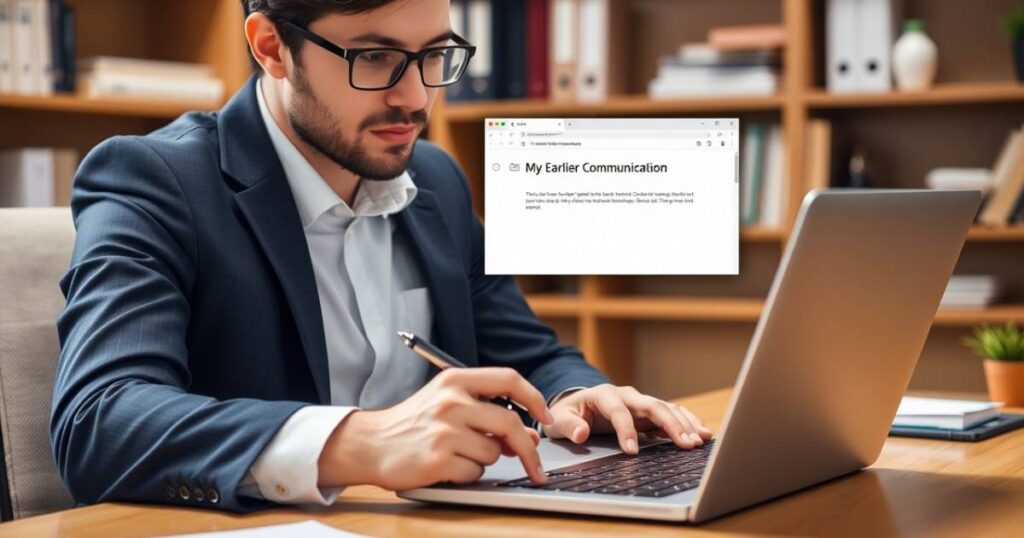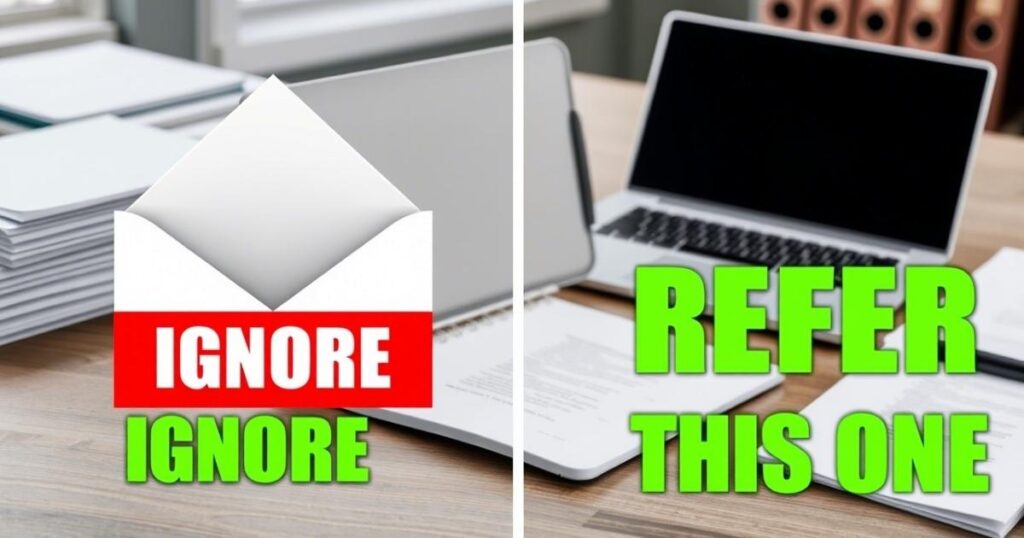Sometimes, mistakes happen in emails, wrong attachments, incorrect info, or just an early send. That’s when the phrase “Please Disregard My Previous Email” becomes helpful. It’s a professional way to let someone know to ignore what you sent earlier. Whether you say please ignore previous mail, ignore previous mail, or please disregard my previous email, the goal is the same: clear up confusion quickly and respectfully.
You might also say please ignore previous mail and consider this mail or please ignore the previous mail and consider this when sending a corrected version. If there’s an updated file, a common option is please ignore the previous mail and consider the attached as latest. Using “Please Disregard My Previous Email” shows you take responsibility and value accurate communication. It’s a simple phrase that avoids misunderstandings and keeps the conversation moving in the right direction.
Is It Professional to Say “Please Disregard My Previous Email”?
Yes, it is professional to say “Please Disregard My Previous Email” when used appropriately. This phrase is commonly used in business and formal settings to clarify or correct information sent in error. It shows accountability and helps maintain clear communication.
Using “Please Disregard My Previous Email” is better than ignoring a mistake or leaving recipients confused. It’s especially useful when an email was sent with incorrect attachments, outdated information, or premature details. It’s a simple way to prevent misunderstandings.
You can also pair this phrase with others like please ignore previous mail or please ignore the previous mail and consider this to be more specific. Being polite and direct in email corrections maintains your professionalism and keeps everyone aligned.
25 Other Ways to Say “Please Disregard My Previous Email”
Here are 25 other ways to say “Please Disregard My Previous Email”, suitable for professional and polite communication:
- Please ignore my earlier message
- Kindly disregard the previous email
- Please ignore the email sent earlier
- Apologies, the earlier email was sent in error
- Please ignore the previous mail and refer to this one
- The last message was incorrect, kindly disregard it
- Please consider this email as the correct version
- Ignore the earlier communication, this one is updated
- Please delete the previous message
- The last email was a mistake sorry for the confusion
- Kindly refer to this updated message instead
- Disregard my last email and see the new one below
- Apologies for the mix-up please refer to this email
- Please overlook my previous note
- Please treat this message as the correct one
- Kindly ignore the last email and consider this as final
- The last mail was outdated, please ignore it
- Please refer to this version instead of the last one
- The prior email had errors, please disregard
- Please see this message as the most recent
- Please ignore the previous message and see the attached
- That email went out prematurely please disregard
- My apologies please ignore my last message
- Disregard the earlier mail; this contains the correct info
- This replaces the message I sent previously please review this one instead
1. Please Ignore My Last Email

This phrase is a clear and polite way to ask the recipient to disregard the previous message. It is particularly useful when there was an error or change that requires an update or clarification.
| Scenario | Details |
| Incorrect data shared | The information provided earlier was wrong |
| Wrong attachment sent | You attached the wrong file |
| Incomplete instructions | The earlier message lacked important details |
2. Consider My Last Email Withdrawn
This phrase is effective for retracting an email that contains errors or miscommunication. It is polite and direct, ensuring that recipients know the prior email should no longer be considered.
| Scenario | Details |
| Incorrect details provided | The information in the last email was inaccurate |
| Misinformation shared | The initial email contained false or incomplete data |
| Prematurely sent information | The content in the email wasn’t yet finalized |
3. My Earlier Email Is No Longer Valid
This phrase helps clarify that the original email no longer applies. It’s helpful when an error was discovered after the email was sent, and the new information supersedes the old.
| Scenario | Details |
| Updated instructions | The original instructions were incorrect |
| New meeting time or date | The meeting time in the earlier email has changed |
| Revised project details | The project plan shared earlier is no longer applicable |
4. Kindly Disregard the Information in My Previous Email
This is a polite way to ask the recipient to disregard specific details from the prior email. It’s ideal for clarifying a mistake or giving new, accurate information.
| Scenario | Details |
| Incorrect data | The data provided earlier was wrong |
| Outdated instructions | The directions or information have changed |
| Incorrect contact details | The contact information shared was wrong |
5. You May Disregard My Previous Email
A straightforward and polite way of retracting a previous email, indicating that it is no longer relevant, applicable, or valid.
| Scenario | Details |
| Canceling a request | The request in the email is no longer needed |
| Incorrect attachment | The wrong file was sent previously |
| Unnecessary follow-up | The previous email was not required |
6. Please Treat My Previous Email as If It Was Never Sent
This phrase is strong and final, signaling that the earlier email should be completely ignored. It’s useful when retracting an important but mistaken email.
| Scenario | Details |
| Error in project proposal | The proposal in the email is no longer valid |
| Wrong information shared | The details provided were completely incorrect |
| Change in strategy | The earlier email was based on a now-outdated plan |
7. My Last Email Is No Longer Relevant; Please Ignore
This statement clearly informs the recipient that the previous email no longer applies, making it an effective choice for rectifying errors.
| Scenario | Details |
| New project updates | The initial project update is now outdated |
| Updated schedule | The event time shared earlier has been revised |
| Clarification needed | The previous email wasn’t clear or accurate |
8. Disregard My Earlier Correspondence
This phrase is simple yet polite, letting the recipient know that the prior message should be ignored without further explanation.
| Scenario | Details |
| Error in meeting details | The meeting information was incorrect |
| Old instructions | The initial guidance was revised or clarified |
| Outdated information | The previous details are no longer applicable |
9. Set Aside My Last Email
This phrase is useful when you want to suggest that the earlier communication should be placed aside or ignored, and you’re providing a new version.
| Scenario | Details |
| Incorrect project timeline | The project dates shared earlier are wrong |
| Misinformation shared | The details in the previous email were incorrect |
| Incorrect proposal sent | The first proposal had incorrect facts |
Related Guide:
100 Motivational Messages For A Hard Working Boyfriend
10. Forget About My Previous Email
A more casual phrase that conveys the same idea of retracting a message. It’s straightforward and polite.
| Scenario | Details |
| Incorrect order placed | The order information in the email was wrong |
| Clarified details | The information previously given was unclear |
| Old, irrelevant information | The email contained outdated facts |
11. Please Dismiss My Earlier Note
This phrase asks the recipient to disregard the previous communication. It’s a polite way of letting them know that the earlier message is not relevant or accurate anymore.
| Scenario | Details |
| Incorrect information | The information provided earlier was wrong |
| Outdated details | The details in the earlier note no longer apply |
| Changes to initial plans | The earlier email discussed plans that have since changed |
12. Ignore My Prior Communication
A direct and simple phrase, this politely tells the recipient that they should disregard the previous message.
| Scenario | Details |
| Previous message was incorrect | The email sent earlier contained errors |
| Misinformation shared | The earlier email shared incorrect details |
| Updated information available | A new, accurate message will follow |
13. Kindly Overlook My Last Message
This polite phrase lets the recipient know that the previous message should be ignored, ideal for addressing mistakes or unnecessary follow-ups.
| Scenario | Details |
| Erroneous attachment | The attachment sent earlier was incorrect |
| Outdated instructions | The instructions provided are no longer valid |
| Incomplete information | The previous message lacked crucial details |
14. My Apologies for the Confusion in My Earlier Email
This phrase includes an apology and clearly indicates that the earlier email caused confusion, requesting the recipient to disregard it.
| Scenario | Details |
| Incorrect project update | The earlier update didn’t reflect the changes |
| Confusing instructions | The earlier instructions were unclear |
| Misleading details | The message earlier had some wrong information |
15. Please Brush Off My Earlier Message
A more casual phrase, indicating that the earlier message should be dismissed or ignored due to mistakes or irrelevant content.
| Scenario | Details |
| Changes to instructions | The directions in the earlier message have been revised |
| Confusing data | The data provided previously was incorrect |
| Reworked schedule | The schedule shared earlier is now outdated |
16. Let’s Move Past My Previous Email
This phrase encourages the recipient to move on from the prior message, often used when the earlier communication is no longer valid.
| Scenario | Details |
| Change in decision | The earlier decision or statement is no longer applicable |
| Old details shared | The information shared earlier is now irrelevant |
| Updated plans | The project or event details have been updated |
17. Please Disregard My Prior Message Entirely
This phrase makes it clear that the earlier message is to be completely ignored, ideal when there was a significant mistake in the communication.
| Scenario | Details |
| Wrong information shared | The information in the prior message was incorrect |
| Miscommunication occurred | The earlier message did not accurately convey the details |
| Outdated details | The details shared earlier have been updated |
18. Consider My Earlier Email Null and Void
This formal phrase effectively tells the recipient to ignore the prior email as it is no longer relevant, complete, or valid.
| Scenario | Details |
| Revised proposal | The proposal in the earlier email has been changed |
| Incorrect instructions | The instructions sent earlier are outdated |
| Disregarded decisions | The previous decisions communicated were invalid |
19. My Previous Email Contained Errors; Please Disregard
This is a polite and clear way to address errors in a prior message, ensuring the recipient understands that the information is no longer valid.
| Scenario | Details |
| Incorrect facts | The facts shared earlier were inaccurate |
| Wrong data | The data provided in the email was incorrect |
| Misleading information | The previous information wasn’t correct |
20. Kindly Excuse the Oversight in My Earlier Communication

This phrase apologizes for any oversight in the earlier email and asks the recipient to disregard it, signaling that the message was not accurate.
| Scenario | Details |
| Data error | The data shared earlier contained errors |
| Wrong instructions | The instructions were inaccurate or incomplete |
| Invalid request | The request or decision was incorrect |
21. Please Ignore the Information I Sent Earlier
This phrase politely requests that the recipient ignores the prior message because it contained incorrect or outdated information.
| Scenario | Details |
| Incorrect figures | The numbers or statistics shared earlier were wrong |
| Outdated offer | The offer provided earlier is no longer valid |
| Changed deadlines | The deadlines in the earlier email are no longer applicable |
22. Kindly Disregard My Previous Communication
A polite and professional phrase asking the recipient to disregard the earlier message, which may have had errors or irrelevant content.
| Scenario | Details |
| Wrong request | The request shared earlier was mistaken |
| Misinformation | The message shared earlier was misleading |
| Unchanged proposal | The proposal was reworked after the first email |
23. Please Forget My Last Email
This is a simple and polite way to tell someone to forget about the previous email, often used when there were significant errors.
| Scenario | Details |
| Unfounded statement | The statement shared earlier was incorrect |
| Incorrect attachment | The attachment was wrong or incomplete |
| Changed circumstances | The information is no longer relevant |
24. My Apologies for the Previous Mistakes, Please Disregard
This phrase expresses an apology and directs the recipient to disregard the prior email, acknowledging mistakes made.
| Scenario | Details |
| Inaccurate details | The details in the earlier email were wrong |
| Wrong instructions | The directions were misleading or incomplete |
| Confusing information | The information caused misunderstandings |
25. Disregard the Previous Message and Accept This One
This phrase is helpful when you’re sending a corrected or updated message and want to make it clear the earlier message is no longer valid.
| Scenario | Details |
| Updated schedule | The original schedule no longer applies |
| Revised proposal | The proposal shared earlier was outdated |
| Clarified data | The data shared earlier was incorrect |
26. Please Ignore Any Confusion Caused by My Last Email
A polite way to address potential confusion from the earlier email, asking the recipient to disregard it due to unclear communication.
| Scenario | Details |
| Confusing details | The earlier message contained unclear or conflicting information |
| Misunderstood instructions | The instructions were misunderstood |
| Disregarded request | The request made in the earlier email is now irrelevant |
27. Kindly Discard the Previous Email
This is a formal, polite way of asking the recipient to disregard the previous email and not consider it further.
| Scenario | Details |
| Inaccurate feedback | The feedback provided earlier was incorrect |
| Changed strategy | The strategy or approach outlined has changed |
| Outdated content | The content shared earlier no longer applies |
28. Ignore the Earlier Email and Refer to This One

This phrase helps you guide the recipient towards the updated or corrected message, making it clear the earlier one should be ignored.
| Scenario | Details |
| Revised instructions | The instructions provided were modified |
| Clarified facts | The facts stated in the earlier message were corrected |
| Updated request | The request now has new details |
FAQ’s
How can I ask someone to ignore my last email politely?
A polite way is using “Please Disregard My Previous Email” when you need to replace incorrect or outdated information sent earlier.
What should I say if I sent the wrong attachment in my last email?
Use “Please Disregard My Previous Email” to let the recipient know a corrected version with the proper attachment is on the way.
How do I clarify a mistake made in a previous email?
Saying “Please Disregard My Previous Email” is a professional approach when correcting errors or updating what was shared before.
What can I write if I emailed too soon or without full info?
If you sent a message prematurely, “Please Disregard My Previous Email” helps pause confusion until you resend complete details.
How do I correct a scheduling error in an earlier message?
For meeting time mistakes, simply send a note saying “Please Disregard My Previous Email” and provide the accurate date and time.
Conclusion
Saying “Please Disregard My Previous Email” is a polite and clear way to correct a mistake or send updated information. It helps prevent confusion and ensures your message is accurate. Whether you’re fixing an error or sending new details, using “Please Disregard My Previous Email” keeps communication professional. You can also say please ignore previous mail or ignore previous mail if that sounds more natural to your tone. It’s important to guide your reader clearly in emails.
If you need them to focus on the most recent message, you might add please ignore the previous mail and consider this or please ignore previous mail and consider this mail instead. When there’s an updated file, use please ignore the previous mail and consider the attached as latest. No matter which version you choose, “Please Disregard My Previous Email” keeps things clear, professional, and respectful in digital communication.

Ivy Belle is an experienced administrator at LondonGrammar, managing content and site operations for over five years. Skilled in blogging, SEO, and user engagement, he ensures a seamless experience for the platform.

